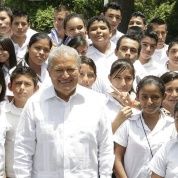Salvador Sanchez Ceren, a former guerrilla commander, was elected President of El Salvador on March 9, 2014, defeating the candidate of the right-wing ARENA party. On June 1, Sanchez Ceren marks one year in office, with the left-wing movement vowing to continue the “deepening of the changes” in the country, despite the considerable social and economic challenges that the country faces.

Sanchez Ceren ran for the ruling Farabundo Marti National Liberation Front, known as the FMLN, the umbrella rebel organization that fought against U.S. backed dictatorships and puppet governments in El Salvador from 1980 to 1992. He assumed the highest office in the small Central American nation on June 1, 2014.
The former school teacher had previously served as the vice president under Mauricio Funes, who broke 20 years of right-wing rule when he was elected in 2009 as the FMLN's candidate.
RELATED: Salvadoran President, Citizens March to Honor Oscar Romero
Sanchez Ceren became the first former guerrilla leader to become president of El Salvador. Funes, the first president under the FMLN ticket, served as a journalist during the civil war and only joined the party ahead of the 2009 elections.
Known as Commander Leonel, Sanchez Ceren served on the guerrilla organization's highest decision-making body, the General Command from 1984-1992. He also played an instrumental role in the struggle for democracy in the country, including the 1992 Chapultepec peace accords, when the FMLN became a legal political party.
Before joining the clandestine guerrilla group, Sanchez Ceren was also a leader in the teacher's union in El Salvador. During his tenure as vice president, Sanchez Ceren worked to prioritize education, something that has carried through under his government.
The levels of illiteracy have dropped considerably during the two governments of the FMLN, with the aim of eliminating it completely. Illiteracy currently sits at 11.5 percent and is expected to drop to 9 percent by 2016. In the last year alone, 22,000 people have learned to read and write.
The current government has also invested in providing basic school supplies, including shoes and uniforms, to every student in the country all the way through high school. In a small, low-income country like El Salvador, access to these materials is an important factor in reducing the drop-out rate, as many students leave school because they are unable to afford even the most basic materials to succeed academically. In 2015, 1,400,000 students will receive educational kits.
The government also recently handed over the first 6,476 of 50,000 computers to schoolchildren, a project that was made possible thanks to the ALBA, which donated the equipment.
El Salvador, under the FMLN, like other progressive governments in the region, has given priority to the straightening of relations with Latin American countries, including partnerships with regional blocs such as ALBA, as well as the Community of Latin American and Caribbean States.
RELATED: Salvadoran President's First 100 Days in Office: Crime Is Priority
Another important initiative of Sanchez Ceren and the FMLN governments has been the implementation of the Miracle Mission, where Cuban and Venezuelan doctors provide free ophthalmology care to low-income patients. While tens of thousands of Salvadorans had their vision restored through operation in Cuba, many more will be assisted through a permanent treatment center in the country. The effort forms part of another of the government's priorities, the major reform of the public healthcare system, which has an eye toward expanding coverage for the country's residents and improving access for those without medical coverage.
The Sanchez Ceren government has also worked diligently to improve the economic prospects for Salvadorans. In 2014, the economy grew by 2.2 percent, outpacing the levels of growth of the previous two years. When public investment is combined with private investment, both foreign and domestic, as well as other sources are combined, El Salvador will see more than US$3 billion in investments in 2015, with even more expected for 2016 and 2017.
The Development Bank has implemented a project to revitalize coffee production in the country, making 17 lines of credit available, which, together with credit from private banks, are worth US$24.3 million.
RELATED: El Salvador Is Divided after Midterm Elections
These investments have played a significant role in increasing the productive capacity of the country, resulting in an increase of exports and the development of new commercial relationships with countries throughout the world. In a move that represents the country's first large export, El Salvador exported 98,500,000 tons of sugar. As a result, many Salvadorians have also moved out of the informal sector and into formal employment.
The FMLN government has also made important investments in the country's infrastructure, working to modernize the country's highway system and energy generation, with the country set to produce 94 megawatts of power from renewable resources, helping to steer the country away from dependence on hydrocarbons.
These efforts have produced what is perhaps the most important achievement of the FMLN governments, the reduction of poverty and the improvement of the lives of Salvadorians. The Sanchez Ceren government, barely a year into its five-year mandate, is taking to heart its mission to govern in a new and different way, one that seeks to increase the participation of the country's residents in order to bring about positive change.